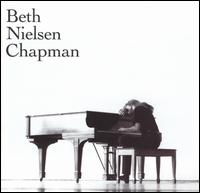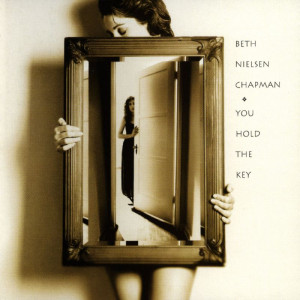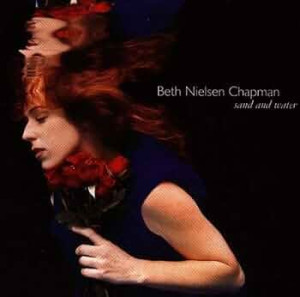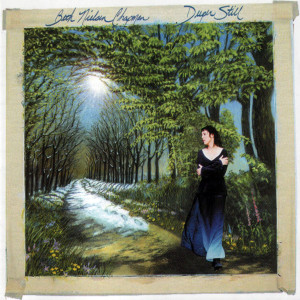 Michelle Erica Green wrote this review.
Michelle Erica Green wrote this review.
It didn’t surprise me to learn that Beth Nielsen Chapman would be singing at the National Cathedral memorial service on September 11, 2002. Chapman’s “Sand and Water” has become one of the best-known contemporary songs about grief; Elton John sang it in concert to describe his pain after the death of Princess Diana, and television shows like ER and Providence played it to indicate character emotions.
I discovered Chapman by accident, when I heard a fragment of the melancholy, romantic “Seven Shades of Blue” on television and managed to track down the singer online. Once I’d gotten the album, Sand and Water took me through all the stages of grief I have ever felt, a wrenching, cathartic experience that brought alternately remembered suffering and great comfort.
Best known as a lyricist, Chapman wrote several beloved country songs for more famous women — Kathy Mattea’s “What Could Have Been,” Faith Hill’s “This Kiss,” Mary Chapin Carpenter’s “Almost Home.” She also co-wrote songs performed by Nanci Griffith, Pam Tillis and Bonnie Raitt. Yet her melodies are difficult to categorize, borrowing from torchy jazz, Sanskrit chant, bluegrass, even church music.
“I think folk is the root of what I do,” she told Dirty Linen in 1998, but stores place her CDs under headings from pop to country to easy listening. Though sweet and controlled, Chapman’s voice isn’t particularly striking. Nor are her melodies easy to sing along with. It’s her words, emphasized by restrained, stately arrangements, which make her so extraordinary. They’re not sophisticated, witty rhymes, but intensely personal, heartfelt observations about love and loss.
For instance, “Life Holds On,” the first song on Beth Nielsen Chapman, begins with a child narrator noting the grass in the cracks in the concrete and concluding that “Where there’s a will, there’s a way around anything,” then leaping years ahead to reflect on her fears and hopes for her own children. The next track “No System For Love” discusses the failure of modern science to probe the mysteries of the human heart: “We have gotten men upon the moon/And babies from a spoon…But we’ve got no system/No system for love.”
The best-known song on Beth Nielsen Chapman, “All I Have,” tells blissfully of an eternal love, with a lovely, romantic melody that has made it a favorite for weddings and on the soap opera Days of Our Lives. The sentimental plea “Down On My Knees,” sung by Chapman as synth-dominated jazz, has earned prominence in twangier recordings by country star Trisha Yearwood and folk singer Christopher Williams.
Issues of faith and personal responsibility recur throughout the CD, a roller coaster of emotions from giddy joy to devastating sorrow. The heartbreaking piano ballad “Emily” and haunting final track “Years” reflect  the difference between how children perceive the passing of time versus adults, who know enough to regret the lost endless summers of youth: “And I thought about years/How they take so long/And they go so fast.”
the difference between how children perceive the passing of time versus adults, who know enough to regret the lost endless summers of youth: “And I thought about years/How they take so long/And they go so fast.”
Chapman’s next CD You Hold the Key shows more obvious jazz influence in the music. “Baby, dance with me slow/Let me fly with you…” she sings, accompanied by strings and trumpet, in a sultry, whirling piece that suggests dancers becoming distracted by the movements of their own bodies. A romantic duet with Paul Carrack, “In the Time It Takes,” offers perky major-key vocals and saxophone to showcase lyrics of temptation and commitment: “In the time it takes to tell you/I could show you…” The understated, chilling “Rage On Rage,” which tells the story of an abusive marriage, precedes “Only So Many Tears,” a breezy light-jazz arrangement with several singers ooh-bopping in the background, offering a cheerier view of a dysfunctional relationship.
Chapman writes superb love songs, occasionally schmaltzy but rarely overblown. “From the Moment You Were Mine” makes nice use of country-inflected guitar. The title song has a bouncy pop sound to go with optimistic sentiments about finding love after suffering from a broken heart. But the real power on this CD, as with all of Chapman’s recordings, comes from compositions that are harder to classify. “I Don’t Know,” a song about trying to make sense of life, reflects the overall confusion with layered backing vocals and some dissonant notes in the chorus as Chapman sings, “I came tumbling through my mother/To this world of different meanings.”
The torchy voice and low piano of “Say It To Me Now” bring out all the impassioned yearnings of the singer — “Everything your heart would say/If all the walls came down” — rising to a powerful musical and emotional peak. “Faithful Heart” combines archaic-sounding rhymes with the sounds of harp, pipe organ, clavichord, Northumbrian pipes and a boys’ choir, producing music that sounds much older than its 1993 copyright. “Dancer To The Drum,” the concluding track, uses traditional instruments to create a soaring anthem:
Lying deep in a dream of darkness
Where fear has never gone
Each spark of a life is started
Blind and pure into the world we come.
Weeks after the release of You Hold the Key, Chapman learned that her  husband Ernest was dying of cancer. The wrenching yet sublime Sand and Water, released four years later, traces Chapman’s stages of grief, acceptance and healing. This can be a difficult album to listen to in a single sitting; even the forced cheeriness of “Happy Girl” (a 1997 hit for Martina McBride) and the snappy, sarcastic “Heads Up For the Wrecking Ball” reflect a world of pain.
husband Ernest was dying of cancer. The wrenching yet sublime Sand and Water, released four years later, traces Chapman’s stages of grief, acceptance and healing. This can be a difficult album to listen to in a single sitting; even the forced cheeriness of “Happy Girl” (a 1997 hit for Martina McBride) and the snappy, sarcastic “Heads Up For the Wrecking Ball” reflect a world of pain.
The first song, “The Color of Roses,” establishes that much of the CD will constitute a dialogue with someone absent, magically reincarnated via music: “I sailed on this ocean/Where all I imagined could happen/And now you are here.” Next, accompanied by hand drums and acoustic guitar, Chapman promises to meet a beloved “Beyond the Blue,” on the outskirts of the sky. Then, seamlessly, she segues into a Hindi chant asking whether she will ever wake from the dream that is life.
The title song, performed on hushed keyboards and echoing guitars that give the music an otherworldly sound, balances Chapman’s crushing loneliness with her faith in an afterlife and her adoration for the son she and Ernest had together — “Flesh and bone, he’s just bursting towards tomorrow/And his laughter fills my world and wears your smile.” The words “All alone” begin half the lines of “Sand and Water,” whose chorus nonetheless mirrors hope in layered female voices:
I will see you in the light of a thousand suns,
I will hear you in the sound of the waves,
I will know you when I come as we all will come
Through the doors beyond the grave.
This assurance recurs again and again on Sand and Water. Sometimes the conviction comes across up-tempo and angry, as in “Happy Girl” and the minor-key lament “Fair Enough” which berates a lover for leaving the singer alone. Sometimes it’s quiet and agonized, as in “No One Knows But You,” where solo piano accompanies the singer’s anguish: “And if there is some magic, some way around these stars / Some road that I can travel to get to where you are / I’ll cry this empty canyon an ocean of my tears / And I won’t stop believing that your love is always near.”
In “Seven Shades of Blue,” which analogizes life’s ups and downs to being a musician, Chapman recalls making love on the kitchen table and reflects  that people can do no wrong when they seize the moment and “take the stage” while they can. Deeply personal yet universal, this is music that can make you cry your eyes out.
that people can do no wrong when they seize the moment and “take the stage” while they can. Deeply personal yet universal, this is music that can make you cry your eyes out.
Deeper Still, Chapman’s latest effort, has a similar effect, for it’s another tale of acceptance — this time of Chapman’s diagnosis with and treatment for breast cancer. Despite the title of the first song, “World of Hurt,” the singer notes that even if we’re on a lonely little planet made of dust and dirt, “who’d ever thinks that in the midst of all this/something as beautiful as love exists?” This upbeat outlook is followed by “Angels By My Side,” in which the desire to live and enjoy the world surges forth whenever the singer becomes threatened by despair.
For that dark emotion has its place on this CD, too, like in “Feathers, Bones, and Shells,” an elegy with lush cello that speaks of the transience of both the material world and our evanescent passions. “Sleep,” with beautiful flute and Native American rhythms, reflects the singer’s underlying “heartcrushing sorrow,” as does the sad piano on “Every December Sky.”
Yet the miracle of hope continues to keep the shadows away. “Wait For the Way” tells of praying for patience when it seems like all hope has been exhausted. “Shake My Soul,” with additional vocals by Bonnie Raitt, uses a rock sound to look wryly at the best-laid plans: “I had it all lined up, then my future crashed/I heard the deadbolt lock and there stood my past…” Still, the elegant title track insists, “You will always have what you give to love.”
The most sing-able tune, “All Comes Down to Love,” makes both verbal and musical nods to the romantic oeuvre of Paul McCartney, but this is no silly love song. It’s as heartfelt as “All You Need Is Love” and sums up the dominating theme of Chapman’s previous recordings. The conclusion, “There’s A Light,” sung with Emmylou Harris, ends the CD on an uplifting, optimistic note.
Chapman’s music and lyrics go to very dark places. The existence of her last two CDs stands as proof of the resilience of the spirit, but these aren’t just personal statements of perseverance. Though the songs are well-crafted and the melodies nice to listen to, those aren’t the reasons I keep coming back to them, either. These are artistic explorations of many of the things that make us human — love, grief, fear, dreams, loneliness — and the unswerving belief, accompanied by personal testimony, that we can always find our way back to the light. In this season of remembered sorrow, they offer healing and hope.
(Reprise, 1990)
(Reprise, 1993)
(Reprise, 1997)
(Artemis, 2002)
